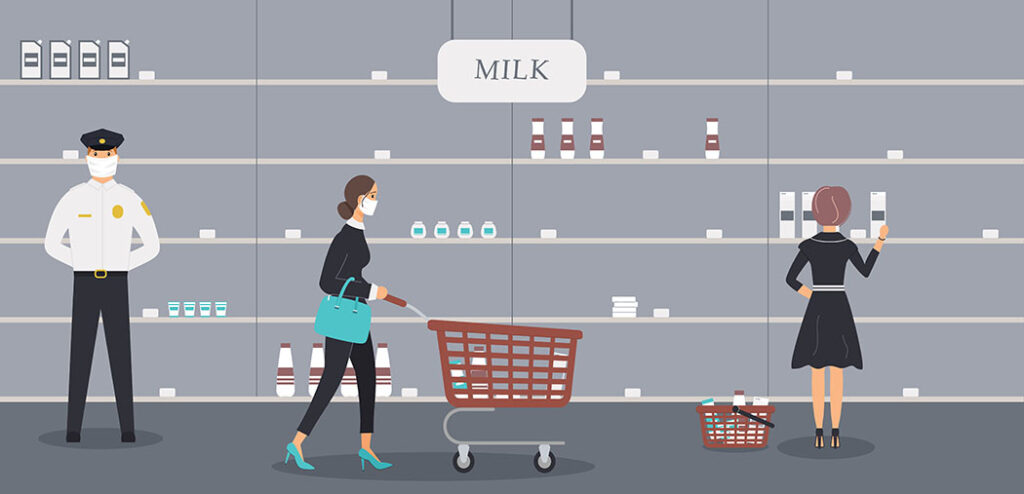World events, now including both COVID-19 and protests, have led to rapid growth in several specific industries: One of them is security guard services for retail and grocery businesses, especially as people start returning in greater numbers. There is enormous new demand in this sector for any security company that can capitalize on it. But what if your company doesn’t have much experience in retail or grocery security? Fortunately, you can still benefit from this new growth, but it’s important to know what to expect when taking on new types of clients! Let’s look at some of the most important factors.
Know Your Client’s Specific Goals Before Making Plans
While this is a clear best practice for every new client, it is particularly important when contracting with a new type of business, and one that may have specific security measures in mind based on recent events or industry changes. So, when meeting with potential retail clients, take time to thoroughly discuss what they have in mind.
Some owners may want security specifically to prevent riots and fighting over supplies in their stores. Others may need guards to limit the number of people that can be in their store at any given time. Some may need guards to make sure customers are following all the rules for social distancing. Still others may be primarily interested in preventing theft and looting.
Narrow down just what your client is looking for, and you’ll be ready to offer just the right services. This is also an important time to clarify the difference between what corporate may require from new security guards, and what a specific store manager may want: Sometimes there’s a little disconnect between the two that’s best resolved sooner rather than later.
Understand and Integrate with the Existing Security System
In the retail/grocery sectors, extensive security systems are often already in place, and security guards are usually hired for more specific duties like those we mentioned above. This means that a key part of working with these businesses is access and understanding of their security system, how your guards will be interacting with, and how your guards will be able to use it while fulfilling their own roles. At minimum, basic communication options should be established so that anything the security system (and any of the store’s own guards) picks up can be immediately relayed to your guards.
Positioning May Be More Difficult, So Stay Prepared
Retail stores aren’t exactly designed with security guards in mind. Aside from security monitoring rooms, there’s not really any place to set up guard posts – so you’ll have to make some. Look for areas where you can set up protective shields (the acrylic point of sale shields that many stores are using for COVID-19 can usually be reused for this) and pylons to maintain some form of separation. Tape and other kinds of floor markings can also be very helpful here.
Positioning also depends on the goals of the retailer that we discussed: For example, guards limiting the number of customers must be stationed at the entrance, while guards trying to prevent fighting over supplies should stay where those supplies are actually on the shelves.
Arrange for Customer-Oriented Security vs. Storage/Backroom Security
Make additional plans based on where your guards will be stationed. If the retail store is primarily interested in customer-facing guards protecting and talking to people in or in front of the storefront, then your guards will need effective communication skills, and preparation for angry people and potentially dangerous situations. If the retailer is primarily concerned with monitoring inventory and storage to help prevent theft, then guards may need to focus more on effective patrols and communication.
Multiple Guards are More Effective for Serious Situations
Tying directly into the point above, know when retailers will need guard teams. While not as large as malls, retail stores can still cover a lot of ground and multiple guards may be needed to effectively deal with all entrances and spaces. For preventing riots and looting, multiple guards at one location have been far more effective than a single guard.
Discuss Access Control If Necessary
Access control in retail usually means that only some staff are allowed into the offices, into the manager’s room (where the safe is often kept), into inventory storage, etc. If your guards need to monitor these locations, then they’ll need the proper access control credentials, which must be issued ahead of time.
Store PPE Regulations are Very Important
Understand and respect all personal protective equipment (PPE) requirements that the retail store may have set up for staff and customers. This might lead to different requirements from other clients, so your guards need to keep any differences in mind. Remember that six-foot distance rules need to be followed in retail areas, and that retailers may ask that guards, like store staff, wash their hands at certain points in time, disinfect equipment regularly, wear face masks, and so on. Remember, stores are facing their own liability questions and have set up these procedures for good reason. You can find more suggestions for good PPE practices here.
Final Thoughts
 Even if retail’s new security requirements feel temporary now, keep in mind that they can lead to additional contracts and new clients down the road, so don’t think that your efforts to meet current demand will go to waste! To learn more about where the security guard industry is headed, keep an eye on our blogs and analysis.
Even if retail’s new security requirements feel temporary now, keep in mind that they can lead to additional contracts and new clients down the road, so don’t think that your efforts to meet current demand will go to waste! To learn more about where the security guard industry is headed, keep an eye on our blogs and analysis.





